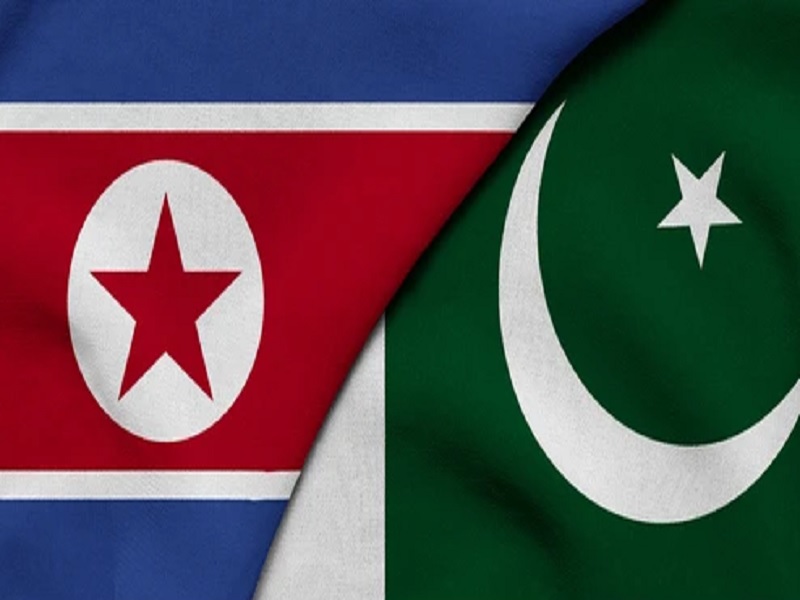The US-led Western Mainstream Media ignored the reports about Pakistan’s speculative involvement in a transnational UK-led airbridge for militarily supplying Kiev while going bonkers about the second one connected to North Korea’s supposed arms sales to Russia. Their conspicuous silence towards the former very strongly suggests some element of truth to those claims while their hysterical over-amplification of the latter similarly suggests that it lacks any actual substance.

Two reports about speculative arms sales to the most direct combatants in the latest US-provokedphase of the Ukrainian Conflict have begun circulating in the media. Late last month, data from flight tracking websites suggested that Pakistan was selling ammunition to Kiev via a transnational UK-led airbridge, which was shortly followed by a viral video purporting to show its artillery being used in the field.
Then earlier this week, the New York Times reported on newly declassified US intelligence claiming that North Korea was selling artillery shells and rockets to Russia. These almost back-to-back allegations were met with completely different responses from the US-led Western Mainstream Media (MSM).
They ignored the first reports about Pakistan’s speculative involvement in a transnational UK-led airbridge for militarily supplying Kiev while going bonkers about the second one connected to North Korea’s supposed arms sales to Russia.
Their conspicuous silence towards the former very strongly suggests some element of truth to those claims while their hysterical over-amplification of the latter similarly suggests that it lacks any actual substance.
Put another way, the MSM’s interests are served by ensuring that the Pakistani report doesn’t gain any traction while simultaneously ensuring that the North Korean one goes viral.
Two reactions to each of them stand out as noteworthy of analysis, however. India, which practices a policy of principled neutrality towards the Ukrainian Conflict in order to carefully balance its objective national interests with respect to the US-led Golden Billion and the BRICS-led Global South of which it’s part, reportedly raised the first-mentioned with London.
Kiev, meanwhile, had its Ministry of Defense mock Russia and North Korea in a tweet which partially read that “Those who are unable to transform to NATO standards, switch to North Korean standards: be it weapons, politics,standard of living.” While Delhi is serious about investigating the first, Kiev only wants to exploit the second for infowar purposes.
From this, objective observers can arrive at two conclusions to help shed on light on the credibility of these respective reports. India, despite having obvious self-interested reasons in pursuing the report about Pakistani arms sales to Kiev via a transnational UK-led airbridge, attaches some credibility to that claim to investigate it in spite of sensitive ongoing defense talks with London.
By contrast, Kiev doesn’t care to investigate the report about North Korean arms sales to Russia and instead is only concerned with weaponizing the optics of this unproven claim in order to manipulate public perceptions about Moscow. Quite clearly, it’s unimportant to Kiev whether or not this report is credible.
In any case, it’s worth briefly discussing what the scenario of either report being credible could mean. Starting with the first about Pakistan, it shouldn’t automatically be assumed that Islamabad has anti-Russian proxy war intentions since its primary motive would probably just be business, though there’s no also no denying that its US-installed post-modern coup regime has political interests in militarily supporting their patron’s Eastern European ally.
As for the second, it’s almost certainly also motivated purely by business-related pursuits too since it’s known to be struggling for hard currency due to international sanctions and definitely doesn’t intend to directly intervene any further in the conflict.
Concerning the recipients, there’s nothing surprising about Kiev receiving arms from a wide array of international partners since it’s volunteered to be used as the top pawn in US-led NATO’s proxy war on Russia through Ukraine.
After all, it’s purely due to unprecedented foreign military support that it’s been able to artificially keep the conflict going instead of capitulating by the end of March at the latest after Zelensky’s senior advisor Arestovich confirmed that Moscow completely destroyed his side’s military-industrial complex.
Against this context of a partially global proxy war against it, nobody should be surprised that Russia might also seek to resupply itself from reliable partners like North Korea.
To wrap it all up, it remains to be seen whether either speculative arms deal has any substance to it, but objective observers should deeply reflect upon the contrast between India’s reportedly ongoing investigation and Kiev’s clear lack of one.
While Delhi has obvious reasons for determining whether Islamabad has begun to play an indirect military role on the West’s side, it’s also neutral in the Ukrainian Conflict so its concerns shouldn’t be dismissed as solely being driven by self-interest.
Likewise, Kiev has obvious reasons for determining whether Pyongyang has begun to play an identical role on Russia’s side, which makes its lack of interest in investigating this very suspicious and thus suggests that it isn’t true.
Republished by The 21st Century
The views expressed in this article are solely those of the author and do not necessarily reflect the opinions of 21cir.com
